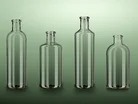Verallia Unveils Sustainable Glass Packaging Solution

Verallia, the world's third-largest producer of glass packaging, known for serving major brands like Heineken, Pernod Ricard and Nestlé, has introduced ECOVA – a new sustainable glass packaging solution.
This move reinforces Verallia’s commitment to innovation and environmental responsibility within the food and beverage industry.
Driving sustainability in glass packaging
Verallia's ECOVA range represents a significant step in the company’s mission to decarbonise its operations.
The new bottles are designed with sustainability at the forefront, offering a lighter weight to reduce carbon emissions during production and transport. This aligns with Verallia’s global objective of reducing Scope 1 and 2 emissions by 46% by 2030.
The ECOVA range, introduced by Verallia UK, reflects the company's dedication to reimagining glass for a sustainable future.
The bottles are made with 51% recycled content and are part of a zero-waste initiative that recycles waste glass back into the manufacturing process.
This eco-friendly approach is a response to the growing consumer demand for sustainable packaging.
Meeting consumer demand for eco-friendly packaging
Verallia UK's Director of NPD, Michael Hogley, highlights the importance of the new ECOVA range in meeting evolving consumer expectations: “As consumer views on sustainability have evolved, we wanted to ensure that we have the most sustainable premium spirit bottle options available.
"The new range is a well thought out solution for brands that want to ensure they have the most sustainable packaging possible while maintaining a stylish look.”
The ECOVA range includes four designs – Patet, Caeli, Vita, and Terra – each weighing 500g. The lighter design not only reduces carbon emissions but also increases pallet capacity by 200 bottles, minimising the packaging needed for shipping. This is particularly advantageous for UK customers looking to reduce their environmental footprint.
Leading the way in sustainable innovation
Under the leadership of CEO Patrice Lucas, Verallia has made sustainability a core focus.
With a background in the automotive industry, Lucas brings a wealth of experience in international business development, particularly in sustainability-driven growth.
“Best in Glass for Verallia is my duty, focusing on sustainable growth, putting ESG at the core of the company and making people a cornerstone,” Lucas says.
“Glass is the material of the future that can be endlessly recycled and reused.”
With the ECOVA range, Verallia provides spirit brands with the opportunity to align with consumer demands for sustainable products, while still showcasing their premium offerings in stylish, eco-friendly packaging.
Making supply chains more sustainable
The introduction of the ECOVA range also has the potential to enhance the sustainability of supply chains.
By reducing the weight of glass bottles and increasing pallet capacity, Verallia enables more efficient transportation, which lowers fuel consumption and decreases the overall carbon footprint of the supply chain.
This optimisation not only benefits Verallia’s direct operations but also supports the broader sustainability goals of its clients, making it easier for companies to build greener supply chains from production to delivery.
Receive the next edition of Scope 3 Magazine by signing up for its newsletter.
As part of this portfolio, make sure you check out Procurement Magazine and also sign up to our global conference series - Procurement & Supply Chain LIVE.
Also check out our Sister Brand, Sustainability Magazine and sign up to its global conference series - Sustainability LIVE.
Scope 3 Magazine is a BizClik brand.
- Moody’s Links Financial Pressure to ESG RiskSupply Chain Sustainability
- L’Oréal: Leading Beauty Towards a Sustainable FutureSupply Chain Sustainability
- Cyber Monday’s Environmental Cost: Scope 3 EmissionsSupply Chain Sustainability
- INVERTO: Time to Act on EU’s Supply Chain Sustainability LawSupply Chain Sustainability

